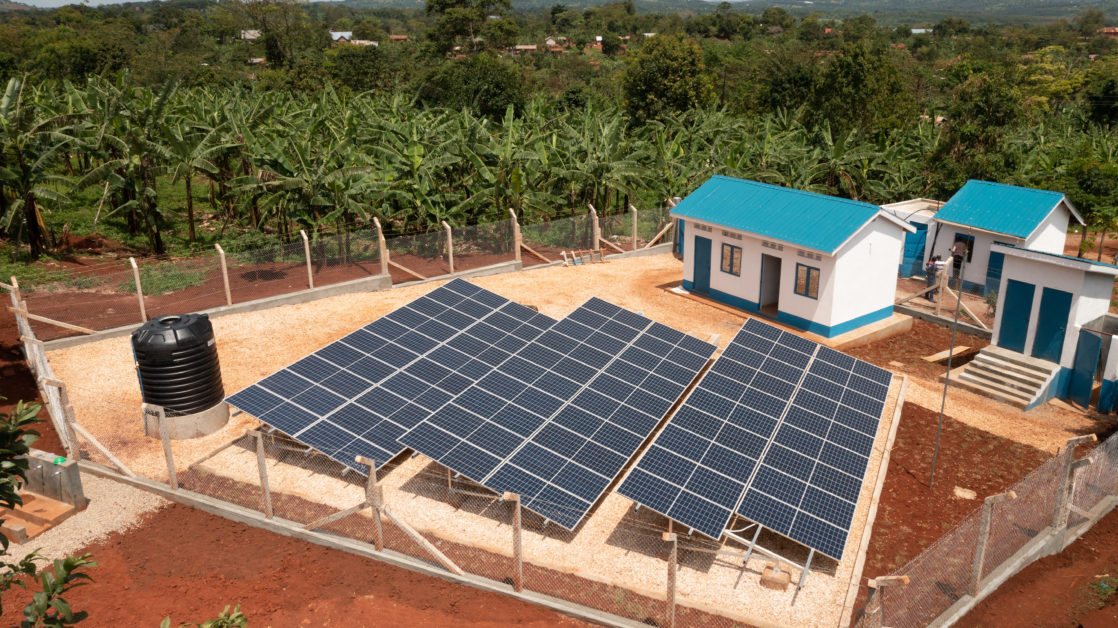Nexus Green Limited, the company contracted by the government of Uganda to construct 687 solar-powered water irrigation sites across the country, has said the project is on course for completion by 2024.
The company says that by the end of 2023, it will have constructed at least 400 solar-powered water irrigation sites in the Northern and Eastern with the remaining 287 sites to be completed in 2024.
The project was first approved by the Parliament of Uganda in September 2021 and a financing agreement between the Government of Uganda (GoU) and the Export Credits Guarantee Department of the UK (UKEF) was signed on 12th February 2021. The project commenced on July 12th, 2021 with its first implementation sites being handed over to Nexus Green in August and September 2021.
Nexus Green is an international solar energy company that specialises in designing, supplying, manufacturing, and delivering affordable solar-powered solutions that reduce carbon emissions and provide cheaper cleaner energy.
The Government of Uganda is investing a total of $90 million in the solar-powered irrigation water project to enhance agricultural productivity, prosperity and the social life of over 25,000 Ugandan households in water-stressed districts in the country. The project is owned by the Ministry of Water and Environment and financed by the Ministry of Finance and Economic Planning and Development.
Speaking ahead of an inspection visit by Members of Parliament from the Committee on Environment and Natural Resources, Parliament of Uganda, Rikki Verma, Chief Executive Officer, Nexus Green said that following the near-completion of preliminary project works such as land acquisition design works, procurement of key equipment, the actual construction was now in earnest.
“We have spent the first six months of year one of the projects on making site verification including confirming site locations and checking the availability of water; stakeholder consultations including; harmonisation of beneficiaries needs, acquisition of land for the project sites; and undertaking designs and procurement of materials (panels, pumps, pipes, fittings) for the first phase,” Verma said.

“For this second year, our focus is now on construction, starting with designing the approved batches of sites. By the end of 2023, we will have built approximately 400 solar-powered water irrigation sites. All these 400 sites are at different stages of design and construction. By the end of 2024, we expect to have handed over all the 687 solar-powered water irrigation sites in Uganda and handover over the project to the Government of Uganda by the end of 2024,” he added.
The MPs are conducting an oversight visit to assess the project implementation by Nexus Green. The MPs will visit 10 districts in Eastern and Northern Uganda including Nakasongola, Apitopat, Lira, Apac, Serere, Soroti, and Bukedea amongst others.
“We look forward to hosting the MPs on the Committee on Environment and Natural Resources as they are very critical to this project- right from its approval and the continued appropriation of resources,” Verma said.
365-days and 4 seasons of irrigation-fed farming
Commenting on the benefit of the project, Verma explained; “This project will increase the number of productive seasons from two to four seasons in a year. Having constantly powered irrigation systems will guarantee UGX 5m worth of revenue per acre, per season resulting in UGX 4.6 trillion which is over 3% of the country’s GDP year in and year out.”
The project is set to benefit at least 3,000 smallholder farmers- an average of 6 farmers on a 12-acre site will benefit from each solar-powered irrigation site, and on the water supply side, at least 5,000 people in rural areas will get access to clean drinking and cooking water while an average of 15,000 people will gain access to urban water supply systems.
Gladys Kiseka Ndagire, a farmer and Irrigation scheme beneficiary in Mpumu in Mukono district testified about the use of the solar-powered irrigation scheme. “Due to changes in climate patterns, it becomes difficult to assess when planting or harvesting season will be. With the irrigation idea, farmers have full control and can be able to plant anything from the start to the end of the year. I encourage fellow farmers to embrace irrigation and improve their yield outcome,” she said.
“After this project, urban dwellers in the target districts are expected to see a 60% reduction in water tariff on 220 urban water supply schemes, in addition to the benefits of green energy and carbon footprint reduction. We expect at least 2.6 million people to see a reduction and prevention of common chronic sicknesses such as typhoid, dysentery, and cholera generally leading to improved health and standard of living within the beneficiary communities,” Verma noted.
Additionally, 2,300 farmers will also gain agronomy skills on various high-value crops like passion fruits, tomatoes, apples, watermelon, rosemary bush, and macadamia, among others through the services of expert agronomists on the project, including information on access to markets, competitive pricing and farm management skills.
